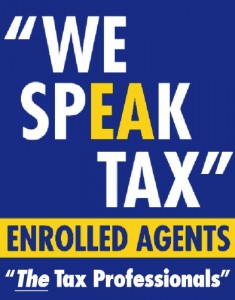What Is An Enrolled Agent?
- An Enrolled Agent is a tax professional specializing in tax preparation, planning, and problem resolution.

- An Enrolled Agent can represent taxpayers before the IRS in matters relating to tax examinations, collections, and appeals.
- An Enrolled Agent is licensed by the U.S. Treasury Department and holds a Federal license with an unrestricted right to practice and represent taxpayers in every U.S. state.
- An Enrolled Agent is held to a strict Code of Professional Ethics.
- An Enrolled Agent is required to take continuing education in tax law and ethics every year.
How does a person become an Enrolled Agent?
The license is earned in one of two ways: (1) by passing a comprehensive two-day, three-part special enrollment examination which covers all aspects of the IRS Tax Code relating to individuals, businesses, trusts, estates, and tax practice, or (2) by working for the IRS for five years in a position which involves interpreting and applying the IRS Tax Code and its regulations. All candidates are subject to a detailed background check conducted by the IRS. Linda earned the Enrolled Agent designation by successfully passing the two-day examination on her first attempt in 1996.
What is the difference between an Enrolled Agent and another tax accountant?
Only Enrolled Agents are required to demonstrate to the IRS their competence in all areas of taxation, taxpayer representation, and ethics before they are given unlimited representation rights before IRS. Attorneys and CPAs are licensed to practice in a specific state and may or may not choose to specialize in taxes.
Why should I choose to work with an Enrolled Agent who is a member of the National Association of Enrolled Agents (NAEA)?
The principal concern of the National Association of Enrolled Agents and its members is the honest, intelligent, and ethical representation of the financial position of taxpayers before the IRS and state tax agencies. Members of NAEA must fulfill continuing professional education requirements that exceed the IRS’ minimum requirements. In addition, NAEA members must follow a stringent Code of Ethics and Rules of Professional Conduct, as well as the U.S. Treasury Department’s Circular 230 regulations. NAEA members belong to a strong network of experienced, well-trained tax professionals who effectively represent their clients and work to make the IRS Tax Code fair and reasonably enforced.

For more information about our tax services, contact our office today at (727) 391-7373.
